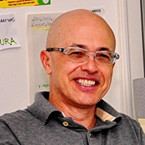Uma revolução no ensino superior?
 Sobre Silvio Meira. Olhe para a imagem abaixo. à primeira vista, parece uma estação de TV, ou o centro de controle de streaming de vídeo de uma operação de web TV. até que seria isso mesmo se estivéssemos comentando uma foto de alguns anos atrás. mas não, é o centro de controle da nanyang technological university, em cingapura.
Sobre Silvio Meira. Olhe para a imagem abaixo. à primeira vista, parece uma estação de TV, ou o centro de controle de streaming de vídeo de uma operação de web TV. até que seria isso mesmo se estivéssemos comentando uma foto de alguns anos atrás. mas não, é o centro de controle da nanyang technological university, em cingapura.você acha que as pessoas que trabalham lá estão controlando o que? nem pense que são os acessos e portas dos laboratórios da universidade; este centro faz parte de um programa, na NTU, de gravar pelo menos 70% das aulas da universidade e deixá-las à disposição dos alunos para posterior visualização. o uso dos vídeos das aulas é monitorado pela universidade e os picos de audiência são… logo depois das aulas [vi, quero rever; perdi, quero ver] e… claro, à véspera dos exames....





/https%3A%2F%2Fprofilepics.canalblog.com%2Fprofilepics%2F1%2F0%2F1076071.jpg)